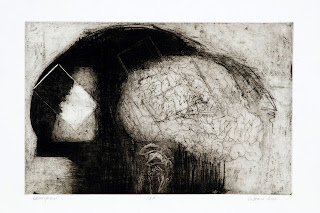thesis: Clive
Staples Lewis presented four arguments against scientism or “the Scientific
Outlook” (his term), but he was not against “real science”:
- In the
historical development of modern science, the scientist often became “the
magician” who could bend reality to fit his will (his introduction to Poetry
and Prose in the Sixteenth Century).
- The myth of evolution, conflates evolution with progress, by melding evolutionary theory with a preceding philosophy
of progress. (“De Fulitate,” “Is
Theology Poetry?”)
- Materialism
is often combined with science as “scientific materialism,” but this is
self-defeating because it obviates finding truth. (Miracles, chapter 3)
- Christianity
fits best with science rightly understood. (“Is Theology Poetry?”)
 |
| Hemispheres by Sarah Sears, conference art work |
Assumption: I am
taking C. S. Lewis as Christian intellectual and humanist scholar who attacked
this form of putatively scientific philosophy as incompatible with reason and
also with Christian belief. I seek to apply Lewis’s insights to the wider
dialogue of science and theology.
3 comments:
I disagree that the myth of evolution conflates evolution with progress. In fact, I don't believe evolution is any more teleological than a waterfall, or a tree growing.
"Scientism" and "Materialism" are words that don't really have a lot of practical application in our daily language. People don't walk around saying "I believe in science." Or, "I am a materialist" in ways that manufacture a consistent world view or practice.
Lots of people trust science: they trust the scientific method and peer review. They trust it enough to get in an airplane, or take a pill, or make an electronic payment. EVERYONE puts a great deal of "faith" in science every day, and it performs quite nicely.
I feel like some of this discussion is 20th century (I guess that should be obvious, duh!) while views in the 21s century have become more diverse and nuanced.
Just remember all this is Lewis's view and is thus (as you note) a bit dated. In my paper, I will be happy to offer my critique...
I agree that evolution as a theory isn't equated with progress. Lewis noted that true scientists (he cited Haldane) note that, in evolution, progress is the exception and degeneration the rule. But Lewis was working with the then-contemporary MYTH of evolution (as in Wells) where it was "things are getting better and better all the time."
I'm not sure many people are consistently anything, whether materialist or Christian. Nonetheless, there is an emergent materialism that New Atheism is promoting. Dennett is one prime example. That might trickle down at some point...
Oh, wow. I didn't know that there was an assumption that there was some sort of sense of ideal forms then.
While I believe in the Everlasting Man, I consider him more "finished" than "perfect", if that makes sense. And by "finished" I mean both done, and adorned.
Put that in a sermon. I like it!
Post a Comment